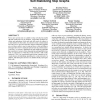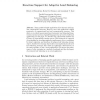38 search results - page 3 / 8 » Complexity of Intensive Communications on Balanced Generaliz... |
PODC
2009
ACM
14 years 8 months ago
2009
ACM
Peer-to-peer systems rely on scalable overlay networks that enable efficient routing between its members. Hypercubic topologies facilitate such operations while each node only nee...
IPPS
2000
IEEE
13 years 12 months ago
2000
IEEE
Abstract. Many parallel scienti c applications have dynamic and irregular computational structure. However, most such applications exhibit persistence of computational load and com...
ICDCS
1991
IEEE
13 years 11 months ago
1991
IEEE
of ‘‘network computers’’ is inherently lessAbstract predictable than that of more traditional distributed memory systems, such as hypercubes [22], since both theFor computa...
AAAI
2010
13 years 9 months ago
2010
As computer architectures become increasingly complex, hand-tuning compiler heuristics becomes increasingly tedious and time consuming for compiler developers. This paper presents...
ICPADS
2007
IEEE
14 years 1 months ago
2007
IEEE
- Due to the increasing complexity of scientific models, large-scale simulation tools often require a critical amount of computational power to produce results in a reasonable amou...


